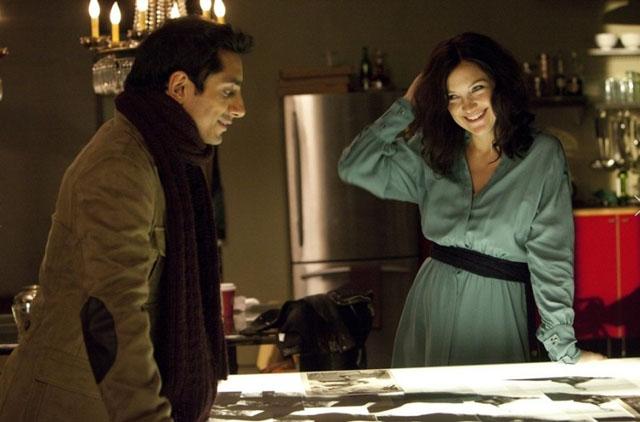The Reluctant Fundamentalist
India, Pakistan, USA 2012
Written by William Wheeler
Directed by Mira Nair
The Reluctant Fundamentalist deals with timely and important concerns like terrorism, prejudice, and paranoid xenophobia. And yet it undermines its relevance by packaging its premise in an overtly dramatized narrative. There’s no question that the filmmakers want to handle their heavy subject matter with an appropriate earnestness, but their efforts come across as reductionist and trivial.
The title of the film refers to the film’s protagonist, Changez (Riz Ahmed). Changez inhabits many different identities through the progression of his life story: immigrant American, Ivy League graduate, Wall Street financier, social pariah, and radical professor. When an American academic is kidnapped by a Pakistani terrorist group, the CIA suspects Changez is involved, due to his supposed incendiary teachings. He agrees to a meeting with a journalist, played by Leiv Schreiber. His cooperation comes with one condition however; the journalist must listen to his entire story from the time he was recruited by a top financial consultation firm to his inevitable rejection of capitalistic ideas. Along the way, Changez falls in and out of love with the American dream and with a free-spirited American artist named Erica (Kate Hudson).
The love story aspect of the movie is, by far, the most mismanaged part. The first transgression is the convenient way in which they meet, entirely by coincidence in Central Park while Erica snaps photos of some daredevil skateboarders. Changez fails to get Erica’s number then, but he runs into her again at a company event, because, as luck would have it, she just so happens to be the niece of a highly placed partner at the firm he works for. Sure, coincidences like this sometimes take place in real life, but they are all too common in the movies. And so the blossoming of their romance notes just one of the plentiful contrivances that expose the artificiality of the film. Hudson and Ahmed also sorely lack any semblance of chemistry, but that could be related to the limited number of intimate scenes they share. The script is obviously more interested in the problems of their relationship than what made it work to begin with.
William Wheeler’s screenplay demonstrates a much better grasp of Changez’s climb up the corporate ladder. His successes in this arena and his working relationships feel truly rewarding, and therefore the devastation of his gradual loss of them plays out in a more or less convincing manner as he labors under an increasing shadow of distrust following 9/11.
The one relationship that seems strongest is his mentorship with Jim Cross (Kiefer Sutherland). Sutherland’s tame portrayal of a business mogul is also a boon for the film. He’s obviously Wheeler’s answer to the American model of success, and his approval of Changez symbolizes acceptance on a broader scale. Jim Cross doesn’t become ominous until the outsider he so generously accepted and nurtured rejects his way of life. Only then does his obsessive greed and hubris rear its ugly head. If only, Changez’s conversion had advanced so delicately. The abruptness by which he reaches his epiphany counteracts any empathy that might have accompanied it, and a very sparse amount of soul-searching leads up to it.
The use of camera and setting is expert and beautiful. It may incite a sense of awe but nothing of emotion. Nair’s techniques expose themselves as manipulations and falter in an attempt to simulate realistic scenarios, and the film this tries to be relies on so many real-life matters that to botch its believability amounts to utter failure.
-Kenneth Broadway
The Tribeca Film Festival runs April 17-28. Visit the official website for more information.



